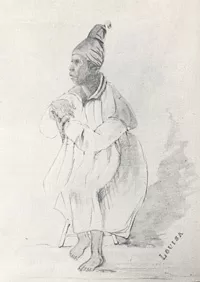Bullrer’s ancestral homeland, known as Trouwunnan, was situated in the far northeast region of Tebrikunna, a territory belonging to the Pairrebeenne clanspeople. Presently, Tebrikunna is recognized as Cape Portland. The Pairrebeenne clan formed part of the Coastal Plains nation, which comprised seven to ten clans.
Bullrer, a native of Tebrikunna, was taken from her clan at the young age of ten and brought to the eastern Bass Strait. She lived with Straitsman James Munro on Preservation Island before joining boatman James Parish, at Robinson’s request, to aid the military with Line operations. In August 1830, she joined Robinson’s expedition in Launceston as a guide to the northeast region. Bullrer was fluent in English and, according to Robinson, a highly intelligent woman of petite stature, standing at approximately 156.03 cm.
Bullrer was the daughter of Pairrebeenne clanswoman Bullrub, also known as Poolrerrener. Her younger brother, Edward Tomlin, bore the alias “Black Ned” and had a European father. Robinson first encountered the seventeen-year-old Edward on Robbins Island, located off the northwest coast of Tasmania. At the time, Edward worked as a boatman with Straitsmen who hunted seals. It is believed that mariners took Bullrub from Tebrikunna to Kangaroo Island, South Australia, a few months after Bullrer’s tenth birthday. Consequently, Bullrer was raised by her clanswoman and remained separated from her mother until adulthood.
In 1830, at the age of eighteen, Bullrer became one of Robinson’s eight guides. Having lived among the Straitsmen for nearly a decade, she proved to be a valuable informant regarding the lifestyles and experiences of women who resided with the Straitsmen. Upon returning to Preservation Island in 1831, Bullrer gifted Robinson a collection of crystals found on the islands. Robinson documented her name change to Louisa when she relocated to Wybalenna, where she lived until at least 1836. Records indicate that Louisa was alive in 1845 and had married two men: Tarnebunner and later, Carlerwarrermeer from the Big River Nation, also known as Tippo Saib or King Tippo. However, there is some ambiguity surrounding the year of her death.
